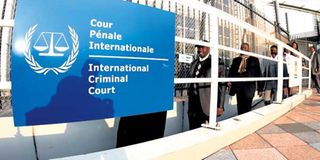Kenyans still apprehensive of political violence if ICC convicts Ruto: Ipsos poll

The International Criminal Court. FILE PHOTO | NATION MEDIA GROUP
What you need to know:
- This means President Uhuru Kenyatta and his deputy still have to address the fear of the possible ethnic political violence.
- The latest Ipsos poll shows more than half of Kenyans are either certain or think there is a possibility of violence if Mr Ruto is convicted in a case facing him at the Hague.
- Mr Ruto is facing charges of being “criminally responsible as a co-perpetrator” to the crimes against humanity.
- The findings indicate just a third of Kenyans are certain there will be no violence upon the convictions, meaning those involved in reconciliation have to work harder.
More than a half of Kenyans think that there would be violence if the International Criminal Court (ICC) convicts Deputy President William Ruto.
This is according to results of the latest opinion poll conducted by Ipsos.
This means President Uhuru Kenyatta and his deputy still have to address the fear of the possible ethnic and political violence, eight years after the 2008 post-election violence that led to more than 1,100 deaths.
The latest Ipsos poll shows more than half of Kenyans are either certain or think there is a possibility of violence if Mr Ruto is convicted in a case facing him at the Hague-based court.
It is ironic since prosecutors at the ICC boasted of making Kenya “an example” of how to deter violence by tackling impunity, and prosecuting alleged perpetrators when they indicted Mr Ruto and five others.
Mr Ruto is facing charges of being “criminally responsible as a co-perpetrator” to the crimes against humanity.
The alleged crimes are murder, deportation and persecution of civilians.
Former radio Journalist Joshua arap Sang, the other remaining suspect whose case is still at the ICC, is accused of the same crimes for “having otherwise contributed” to their commission during the 2008 post-election violence.
After interviewing 1,964 adult Kenyans around the country between March 28 and April 7, 2015, the pollsters say they found that Kenyans are equally divided on whether they feel the cases facing Mr Ruto and Mr Sang will lead to a conviction.
But when they asked: “How likely do you think it is that there will be any violence if Ruto is convicted?” nearly a third (27 per cent) of Kenyans were “certain” while a similar fraction said it is “possible” there will be violence.
The result is even curious given there that is no difference in opinion on ICC convictions between those who support President Kenyatta’s Jubilee coalition and the opposition Cord despite the fact that ICC became a hot political issue during the last campaigns.
Ipsos clarified Sunday that it did not ask Kenyans where the violence would be or who the perpetrators or their targets would be.
WORK HARDER ON RECONCILIATION
However, the findings indicate just a third of Kenyans are certain there will be no violence upon the convictions, meaning those involved in reconciliation have to work harder.
“There have been some changes at the ICC with the prosecutor saying the evidence at hand is weak. This shows we could probably get a lower figure of those worried about violence if we went back to ask them,” Ipsos Research Analyst Tom Wolf told the Nation on Sunday.
In an interview last year, former ICC Prosecutor Luis Moreno-Ocampo admitted there had been diplomatic pressure to have President Kenyatta and Mr Ruto be thrown out of the race to lead the country.
But he argued the two had been “smart” to preach a unity card between Kalenjins and Kikuyus, two communities that fought bitterly in the 2008 violence.
“They made an alliance and they presented themselves as the reconciliation process,” Ocampo told Radio Netherlands Worldwide on January 21, 2014.
In the violence that rocked the nation in 2008, the Waki Commission reported 1,133 deaths, 3,561 injuries and 117, 216 instances of looting and property destruction.
It found that the violence had been incited and funded by politicians who rode on the ethnic tide although there had been historical issues such as land and political marginalisation.
The Commission recommended the prosecution of those involved.
The ICC was initially popular in Kenya, winning about 70 per cent support at some point.
That popularity dropped with the indictment of six Kenyans but it was generally thought it would deter violence in future.
“My observation is that the international community failed to understand the dynamics in Kenyan politics by thinking an indictment would discourage violence.
“The truth is Jubilee successfully appropriated to themselves the narrative of peace and reconciliation. They have preserved it to date,” argued Mr Wolf.




